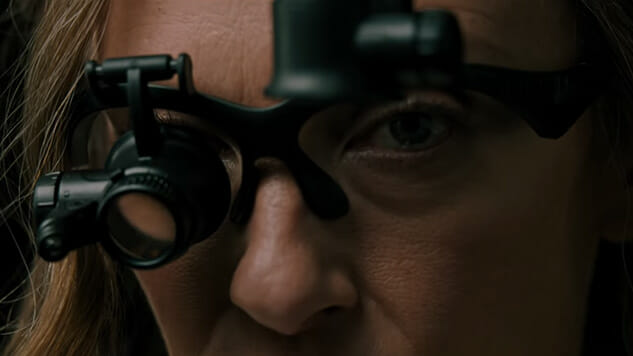Hereditary

Ari Aster’s debut film begins in miniature. Later we learn of the trade Annie (Toni Collette), the film’s family’s matriarch, plies—meticulously designing doll-house-sized vignettes of the many domestic traumas she’s experienced, and still does, throughout her life, not for children but for art gallery spaces—though in the moment, in the beginning of Hereditary, the effect simply alludes to Aster’s ancestral preoccupations. From a tree house, pulling back through Annie’s workshop window, cinematographer Pawel Pogorzelski’s camera pans to a tiny recreation of the house we’re currently within, then pushes into the simulacrum of high school student Peter Graham’s (Alex Wolff) bedroom, which transforms into the room itself, perspectives already ruined so early in the film. Father Steve (Gabriel Byrne) enters to give his late-snoozing son the funereal suit needed to attend his late grandmother’s memorial. Aster’s intent, as is the case throughout Hereditary, is both blunt and oblique: worlds exist within worlds, shadows within that which casts them, or vice versa, reality represented like the rings of a tree or the spirals of DNA holding untold secrets within the cores of whoever we are. Colin Stetson’s brain-churning score rattles the frame’s edges. Menace looms.
And menace soon unfolds, tragedies upon tragedies. After the funeral, Annie casually mentions to Steve that she feels bad for not feeling worse, unable on some fundamental level to connect with her 13-year-old daughter Charlie (Milly Shapiro), who silently mourns her grandmother in ways Annie cannot, both because Annie still resents her mother for countless agressions and failures, and because Charlie is so stolidly odd, making weird clucking noises and assembling action figures out of dead bird parts and hardware detritus. Preternaturally dour, the young girl practically hides behind an aura of peril. Aster deftly explores these familial ties without laying them bare—not so much cloaking the Graham family in mystery as just refusing to delineate that which resists clear lines—revealing just enough information, just as we begin to intuit that the information is missing, to provide sense and depth to this family’s ostensibly ordinary dysfunction. Is Peter’s resentment towards his mom spawned from his anticipation of finally graduating and getting out of the house, or does the past hold something worse? Is the distance between Steve and Annie typical for a couple married that long, or are more sinister forces lurking within all that pregnant quiet? Aster draws dread from everything that goes unspoken.
Of course, the Graham family unravels over the course of Hereditary, all signs, supernatural and not, pointing to Annie’s mother as the source of original sin. It’s no surprise that Aster wants to explore how evil tumbles down through generations, growing in girth as it inherits new pain and broader lineages, but the truly terrifying nature of the film, once the essence of that evil comes into view, is how claustrophobically Aster hems in his characters. To watch catastrophe dawn on Collette’s face as her character realizes she’s doomed, that there is nothing she can do to stop the unspeakable from happening, is to feel the weight of grief and loss as sharply as the occasional jump scare or grotesque image Aster tastefully places throughout. Collette is remarkable, not only because Annie writhes inside so many contradictory impulses, wrestling with so much prelapsarian pain, but because her head literally bears the weight of Aster’s horror. Like Goodnight Mommy, a film which similarly pulls apart bloodlines at the root, Hereditary derives its power from testing the binds that force families together, teasing their strength as each family member must confront, kicking and screaming (or in Collette’s case: making the noise of one’s soul fleeing through every orifice), just how superficial those binds can be.
-

-

-

-

-

-

-

-

-

-

-

-

-

-

-

-

-

-

-

-

-

-

-

-

-

-

-

-

-

-

-

-

-

-

-

-

-

-

-

-








































